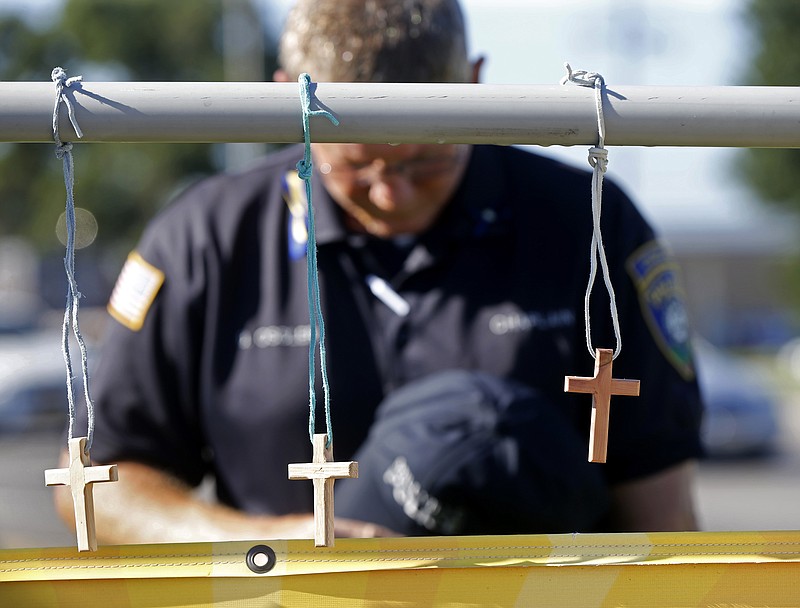On Wednesday, Nov. 5, 2008, the morning after Election Day, a black man approached a white stranger in the parking lot at Bojangles on 23rd Street.
"I guess what happened last night was your worst nightmare," the black man said.
The white man, who just wanted a chicken biscuit, did not reply.
Were incidents like this, many wondered at the time, what life was to be like under Barack Obama, the first black president in the country's history?
Fast forward seven and a half years.
For the first time in Obama's presidency, a majority of Americans believe race relations have gotten worse under his tenure.
Indeed, 60 percent of respondents in a Rasmussen poll released five days ago - up from 42 percent in 2014 - believe relations have worsened.
The poll indicates 51 percent of minorities, including 38 percent of blacks, and 66 percent of white respondents think race relations have deteriorated.
Did it have to be that way?
After winning his first race for the nation's high office, Obama was proclaimed far and wide as the country's first post-racial president. Although the intent to be such never specifically came out of his mouth, he didn't fight the notion promoted before and during the campaign by starry-eyed columnists, left-wing politicians and guilty feeling whites.
"There's not a black America and white America and Latino America and Asian America," he said during his vaunted keynote address at the 2004 Democratic National Convention. "There's the United States of America."
"[Mine] is a story that has seared into my genetic makeup the idea that this nation is more than the sum of its parts - that out of many, we are truly one," he said in his acceptance speech at the 2008 Democratic National Convention.
Following the election, columnist John McWhorter, a senior fellow at the Manhattan Institute, said in a Forbes column that "Racism In America Is Over." Senior News Analyst Daniel Schorr, in a National Public Radio blog, proclaimed "A New, 'Post-Racial' Political Era in America." Shelby Steele, in a column in the Los Angeles Times, referred to it as "Obama's post-racial promise."
Once president, Obama, for his part, repeatedly said we certainly are not in a post-racial era. And his politics doubled down on his words.
That was evident very early in his administration when the president got involved in the arrest by a white Cambridge, Mass., police officer of a black Harvard professor following a 9-1-1 call reporting someone trying to burglarize a house. Dr. Henry Louis "Skip" Gates was, in fact, trying to force the door on his own home open because it was jammed. The president said the Cambridge police "acted stupidly" and later conducted what became known as the "beer summit" in an attempt to smooth feelings.
We then could cite a litany of incidents, from mass shootings to school behavior to prison overcrowding to police shootings, where Obama raised the specter of race instead of dealing with the problem - general or specific - on its own merits.
The citation by the Rasmussen poll of an 18-point drop in two years, in fact, mirrors the very time when the president's leadership should have been strongest but has been its most divisive. The incident in Ferguson, Mo., two years ago this summer, where a black robbery suspect was shot by a white officer, set off the powder keg.
Today, in the vacuum left by Obama's lack of race-blind leadership, issue after issue, from health care to Oscar nominations to wealth to education to cartoons, are wrongly cast by some people in the light of racism. And shootings of police, in an apparent kind of psychotic revenge for some justified and some unjustified shootings of black suspects by law enforcement in different parts of the country, have become a weekly if not a daily occurrence.
A majority of people, at least according to the Rasmussen poll, finally have decided they can no longer give the president the benefit of the doubt on race relations.
Only 9 percent of black respondents said relations have improved under Obama, and the best that 49 percent of blacks could say was that relations have stayed they same. A whopping 84 percent of Republicans and 67 percent of unaffiliated voters believe things have worsened.
The poll also reveals that, depending on the presidential election results, race relations may get worse before they get better. Republicans, who control Congress, believe parental and personal responsibility are the keys to improving relations. Democrats, who control the White House and want to deliver the president's "third term" by electing Hillary Clinton, say more government is the answer.
We in America may be a lot of things in this decade, but post-racial we are not.
